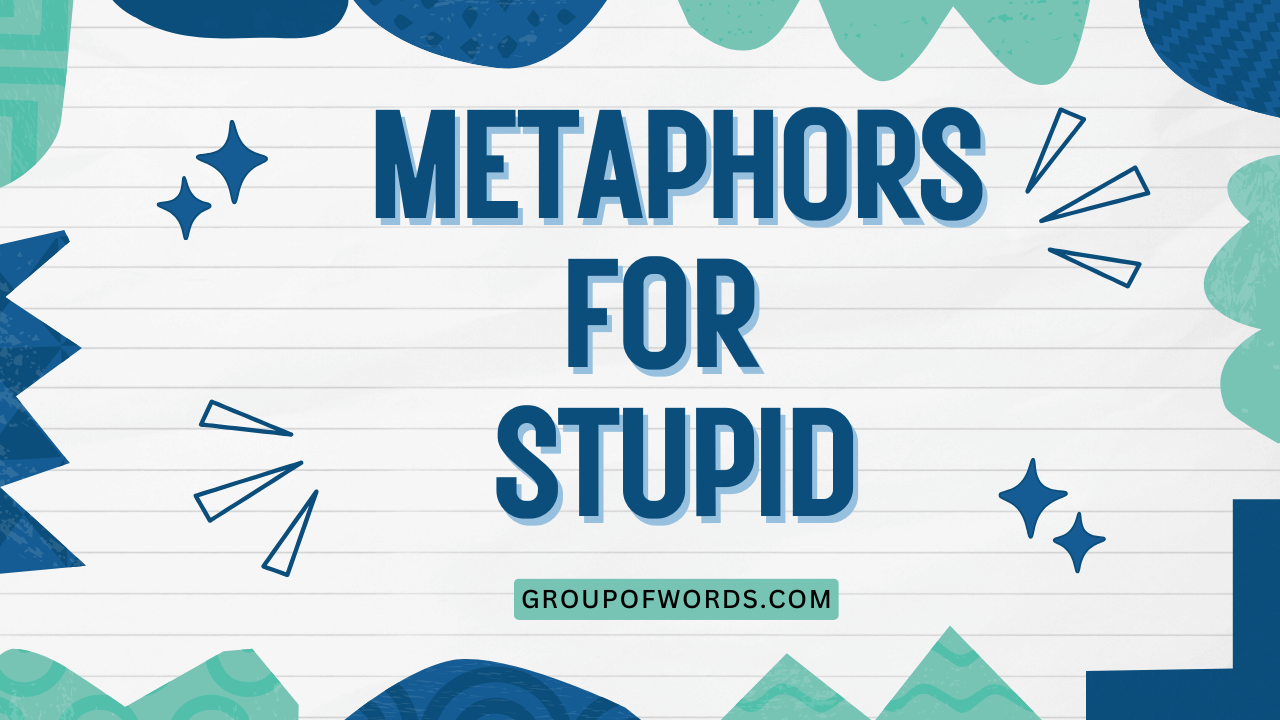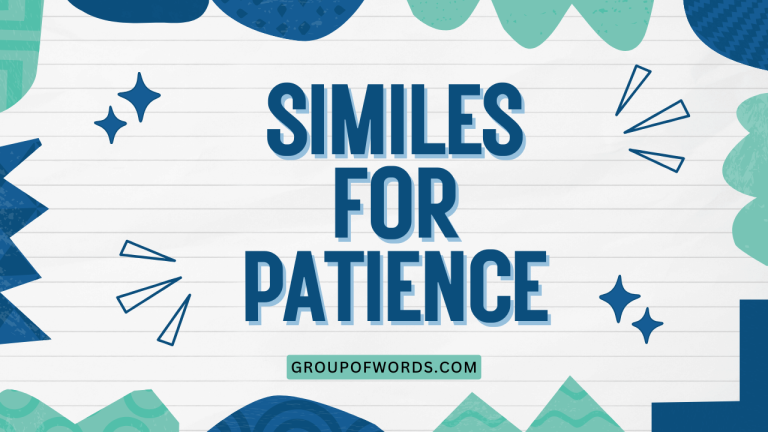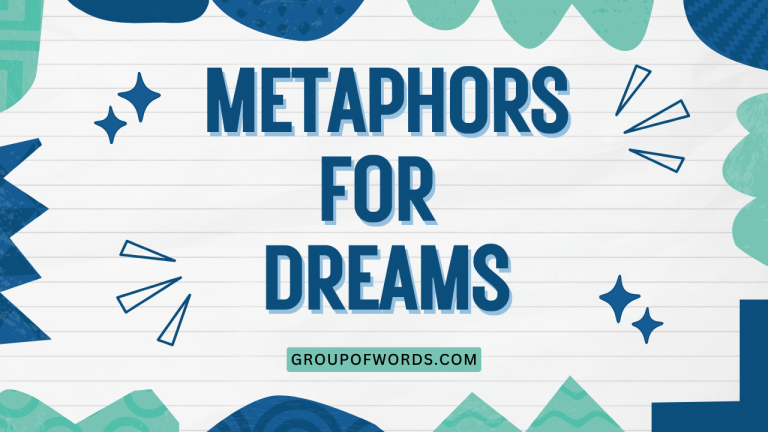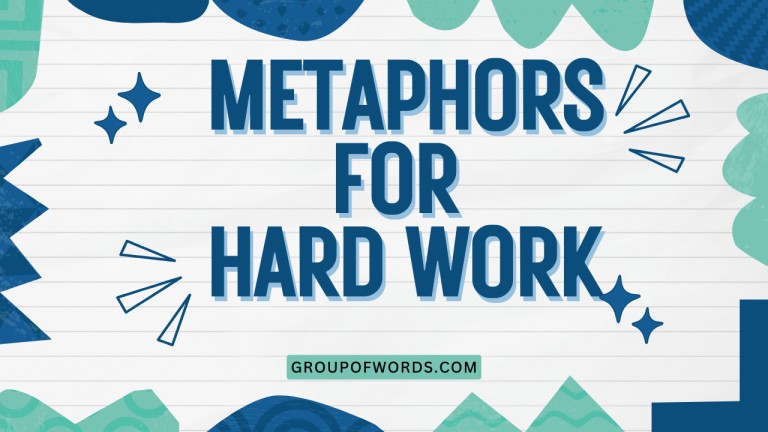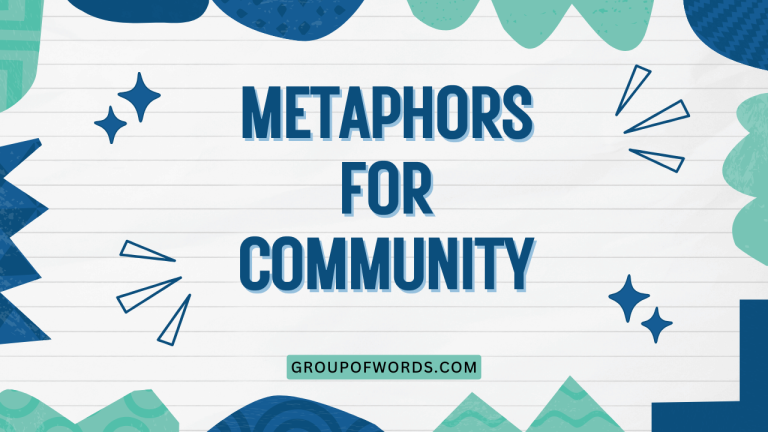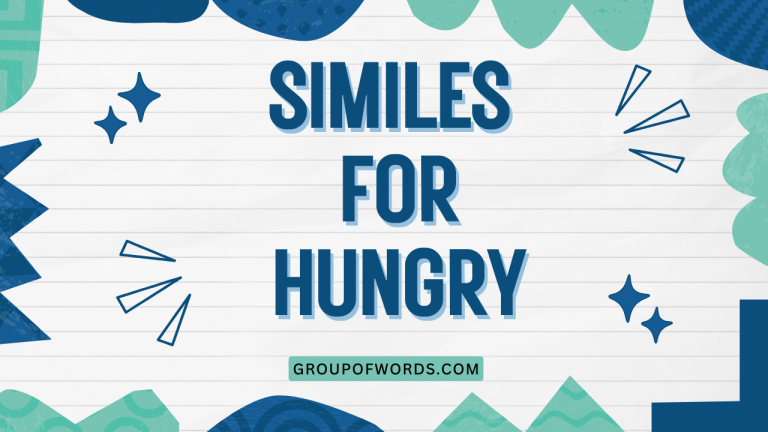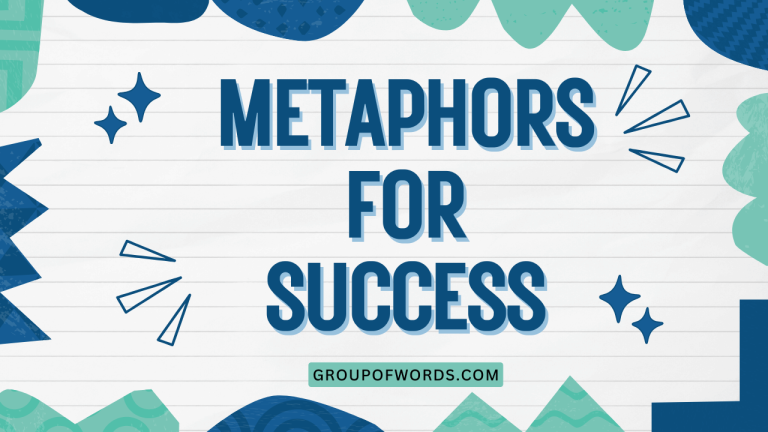Metaphors for Stupidity: A Grammatical Exploration
Understanding how we use metaphors to describe intellectual shortcomings is crucial for mastering nuanced communication. This article delves into the various metaphors used to convey the concept of “stupidity,” exploring their grammatical structures, cultural implications, and appropriate contexts.
By dissecting these figures of speech, English language learners and native speakers alike can enhance their ability to express themselves accurately and effectively, avoiding misinterpretations and fostering clearer communication. This guide is beneficial for students, writers, and anyone wishing to refine their understanding of figurative language.
Table of Contents
- Introduction
- Definition of Metaphors for Stupidity
- Structural Breakdown
- Types and Categories of Metaphors
- Examples of Metaphors for Stupidity
- Usage Rules
- Common Mistakes
- Practice Exercises
- Advanced Topics
- FAQ
- Conclusion
Definition of Metaphors for Stupidity
A metaphor for stupidity is a figure of speech that compares a person’s lack of intelligence or understanding to something else, typically something considered simple, slow, or lacking in complexity. These metaphors don’t literally mean the person *is* the thing they’re compared to; rather, they suggest a similarity in perceived intellectual capacity.
They are a form of indirect communication, relying on the listener’s ability to understand the implied comparison.
Metaphors for stupidity fall under the broader category of figurative language, specifically within the subcategory of tropes, which involve altering the usual meaning of words. Their function is primarily expressive, conveying not just the fact of someone’s perceived lack of intelligence but also the speaker’s attitude towards it, which can range from mild amusement to harsh criticism. The context in which these metaphors are used is crucial; what might be acceptable in informal conversation could be offensive in a formal setting.
The use of metaphors for stupidity can be traced back through centuries of literature and everyday speech. They reflect cultural attitudes toward intelligence and often carry historical or social connotations.
Understanding these connotations is vital for using these metaphors appropriately and avoiding unintended offense. The effectiveness of a metaphor lies in its ability to create a vivid and memorable image, allowing for a more impactful communication than a direct statement.
Structural Breakdown
Metaphors for stupidity, like all metaphors, operate on the principle of implied comparison. This comparison typically involves two elements: the tenor (the subject being described, i.e., the person perceived as stupid) and the vehicle (the thing the subject is being compared to). The connection between the tenor and vehicle is the ground, the shared qualities or characteristics that make the comparison apt. In the case of metaphors for stupidity, the ground usually involves a lack of intelligence, understanding, or common sense.
The basic structure can be represented as: “X is Y,” where X is the tenor (the person) and Y is the vehicle (the metaphor). For example, in the phrase “He’s a bit slow,” “he” is the tenor and “slow” is the vehicle.
The ground is the shared characteristic of lacking quickness in understanding or processing information. Often, the verb “to be” is implied or replaced with other linking verbs, such as “seems,” “acts,” or “behaves like.”
The effectiveness of the metaphor depends on the listener’s understanding of the vehicle’s connotations. A well-chosen vehicle will immediately evoke the desired image or association.
The success of the metaphor also relies on the context in which it is used. A metaphor that works well in one situation might be completely inappropriate in another.
The structural simplicity allows for a broad range of applications, making it a versatile tool in colloquial language.
Types and Categories of Metaphors
Metaphors for stupidity can be categorized based on the type of vehicle used to create the comparison. Here are some common categories:
Animal Metaphors
Animals are frequently used to represent stupidity, often based on perceived animal behaviors or characteristics. These metaphors can range from relatively mild to highly insulting, depending on the animal chosen and the context of the comparison.
The specific animal often carries cultural connotations that contribute to the overall meaning of the metaphor.
Object Metaphors
Inanimate objects can also be used to represent stupidity, typically by comparing a person’s mind or thought processes to something simple, empty, or broken. These metaphors often highlight a lack of complexity or functionality.
The chosen object usually reflects a perceived lack of sophistication or capability.
Food Metaphors
Food-related metaphors often describe a person as lacking substance or being easily manipulated. These metaphors can also suggest a lack of intelligence or awareness.
The specific food item often contributes to the overall implication of the metaphor.
Physical State Metaphors
These metaphors compare a person’s intellectual capacity to a physical state, such as being slow, dense, or lacking sharpness. These often imply a general lack of mental agility or awareness.
The physical state usually reflects a perceived inability to process information effectively.
Weather Metaphors
Weather metaphors can be used to describe a person’s mind as being clouded, foggy, or otherwise obscured, suggesting a lack of clarity or understanding. These metaphors often imply a temporary or situational lack of mental acuity.
The weather condition typically reflects a perceived state of confusion or disorientation.
Examples of Metaphors for Stupidity
Here are some specific examples of metaphors for stupidity, categorized by type:
Animal Metaphor Examples
Animal metaphors are a common way to describe someone as stupid. The choice of animal often reflects the perceived type of stupidity.
The following table contains various examples.
| Metaphor | Explanation | Example Sentence |
|---|---|---|
| Dumb as a doornail | Implies complete lack of intelligence or awareness. | He’s as dumb as a doornail; I doubt he understood a word of the lecture. |
| Like a sheep | Suggests a person blindly follows others without thinking. | They all followed the leader like sheep, never questioning his decisions. |
| Bird-brained | Indicates a lack of intelligence or shallow thinking. | She’s a bit bird-brained, but she means well. |
| Thick as a brick | Implies extreme stupidity and inability to understand simple concepts. | He’s as thick as a brick; I tried explaining it three times, but he still didn’t get it. |
| Slow as a snail | Suggests a slow pace of thinking or understanding. | He’s slow as a snail when it comes to math problems. |
| Like a deer in headlights | Describes someone who is stunned and unable to react in a situation. | When I asked him the question, he just stood there like a deer in headlights. |
| A silly goose | Indicates foolishness or lack of common sense. | Don’t be such a silly goose; of course, you need to plug it in! |
| Led like lambs to the slaughter | Suggests being easily deceived or manipulated. | The investors were led like lambs to the slaughter by the fraudulent scheme. |
| Like a headless chicken | Describes someone who is running around frantically without direction. | She was running around like a headless chicken trying to find her keys. |
| A dumb bunny | Implies naiveté or lack of sophistication. | He’s such a dumb bunny; he believes everything he reads online. |
| Stubborn as a mule | Suggests an unwillingness to learn or change one’s mind. | He’s as stubborn as a mule; you’ll never convince him otherwise. |
| Dense as lead | Implies a lack of intelligence or understanding. | He’s dense as lead; it takes forever to explain anything to him. |
| A simpleton | Describes someone who is naive or unsophisticated. | He’s a simpleton and easily tricked. |
| Like a trained seal | Suggests someone who performs tasks without understanding why. | He just does what he’s told, like a trained seal. |
| As daft as a brush | (British English) Implies foolishness or silliness. | He’s as daft as a brush, bless him. |
| A nitwit | Describes a foolish or stupid person. | He’s such a nitwit; he locked himself out of the house again. |
| Thick in the head | Implies slow thinking or a lack of understanding. | He’s a bit thick in the head sometimes, but he’s a good guy. |
| A halfwit | Describes someone who is considered foolish or stupid. | He’s a halfwit if he thinks he can get away with that. |
| A twit | Describes a silly or foolish person. | Don’t be such a twit; it’s not that complicated. |
| As green as grass | Implies naiveté or inexperience. | He’s as green as grass when it comes to business. |
Object Metaphor Examples
Object metaphors rely on comparing a person’s intellect to inanimate objects. These comparisons often highlight a perceived lack of complexity or sharpness.
The following table shows several examples.
| Metaphor | Explanation | Example Sentence |
|---|---|---|
| Not the sharpest tool in the shed | Indicates a lack of intelligence or cleverness. | He’s not the sharpest tool in the shed, but he’s hardworking. |
| A few bricks short of a load | Suggests someone is not quite all there mentally. | I think he’s a few bricks short of a load; he says some strange things. |
| Empty-headed | Describes someone who is lacking in intelligence or thoughts. | She’s beautiful, but a bit empty-headed, I’m afraid. |
| Out to lunch | Implies someone is not paying attention or is mentally absent. | He seems to be out to lunch most of the time during meetings. |
| A blank slate | Suggests someone has no knowledge or experience. | He’s a blank slate when it comes to politics; he knows nothing about it. |
| A broken record | Describes someone who repeats the same thing over and over. | He’s like a broken record; he keeps saying the same thing. |
| A dull knife | Implies a lack of sharpness or intelligence. | She’s a bit of a dull knife when it comes to solving problems. |
| A light bulb is missing | Suggests a lack of intelligence or understanding. | It’s like a light bulb is missing in his head; he just doesn’t get it. |
| A cog out of place | Implies something is not functioning correctly in the brain. | I think he has a cog out of place; he’s acting very strangely. |
| A loose screw | Suggests someone is slightly crazy or foolish. | I think he has a loose screw; he’s always doing crazy things. |
| Running on empty | Implies a lack of mental energy or focus. | He’s running on empty today; he didn’t get much sleep. |
| A one-trick pony | Describes someone who is only good at one thing. | He’s a one-trick pony; he can only do that one thing well. |
| A wet blanket | Describes someone who is depressing or unenthusiastic. | He’s such a wet blanket; he always ruins the fun. |
| A square peg in a round hole | Implies someone is not suited for a particular situation or role. | He’s a square peg in a round hole; he doesn’t fit in here. |
| Lost his marbles | Suggests someone has become senile or foolish. | I think he’s lost his marbles; he’s saying some strange things. |
| Not all there | Implies someone is not fully present or mentally alert. | He’s not all there today; he seems distracted. |
| Off his rocker | Suggests someone is crazy or eccentric. | He’s off his rocker if he thinks he can get away with that. |
| A basket case | Describes someone who is emotionally or mentally unstable. | She’s a basket case after the breakup. |
| A space cadet | Describes someone who is absent-minded or out of touch with reality. | He’s such a space cadet; he’s always forgetting things. |
| Living in his own world | Implies someone is detached from reality. | He’s living in his own world; he doesn’t understand what’s going on. |
Food Metaphor Examples
Food metaphors often describe someone as lacking substance or being easily manipulated. These examples show the variety of food-related comparisons.
| Metaphor | Explanation | Example Sentence |
|---|---|---|
| Half-baked | Suggests an idea or plan is not fully thought out or practical. | That’s a half-baked idea; it’ll never work. |
| A fruitcake | Describes someone who is eccentric or crazy. | He’s a bit of a fruitcake, but he’s harmless. |
| A cream puff | Describes someone who is weak or easily defeated. | He’s a cream puff; he’ll never stand up for himself. |
| Wet noodle | Describes someone who is weak and ineffective. | He’s a wet noodle; he can’t make any decisions. |
| A sandwich short of a picnic | Suggests someone is not very intelligent. | I think he’s a sandwich short of a picnic; he doesn’t understand simple things. |
| Not the brightest bulb in the box | Indicates a lack of intelligence or cleverness. | He’s not the brightest bulb in the box, but he tries hard. |
| A tough cookie | Describes someone who is resilient and determined. | She’s a tough cookie; she can handle anything. |
| A smart cookie | Describes someone who is intelligent and clever. | She’s a smart cookie; she always knows the answer. |
| Full of baloney | Suggests someone is talking nonsense or lying. | He’s full of baloney; don’t believe anything he says. |
| A bad egg | Describes someone who is dishonest or unreliable. | He’s a bad egg; stay away from him. |
| A hard nut to crack | Describes someone who is difficult to understand or deal with. | He’s a hard nut to crack; I can’t figure him out. |
| A piece of cake | Describes something that is very easy to do. | The test was a piece of cake; I finished it in no time. |
| A couch potato | Describes someone who spends a lot of time sitting and watching television. | He’s a couch potato; he never leaves the house. |
| A hot potato | Describes a controversial or difficult issue. | The issue of immigration is a hot potato. |
| A gravy train | Describes a situation where someone is making easy money. | He’s on the gravy train; he’s making a fortune. |
| Eating crow | Describes someone who is forced to admit they were wrong. | He had to eat crow after his prediction proved false. |
| Spilling the beans | Describes someone who is revealing a secret. | He spilled the beans about the surprise party. |
| A sugar daddy | Describes a wealthy older man who provides financial support to a younger person. | She’s got a sugar daddy who pays for everything. |
| A tough act to follow | Describes someone or something that is difficult to surpass. | His performance was a tough act to follow. |
| A lemon | Describes something that is defective or unsatisfactory. | The car turned out to be a lemon. |
Physical State Metaphor Examples
These metaphors compare intelligence to physical states, often implying a lack of mental agility. The following table provides examples.
| Metaphor | Explanation | Example Sentence |
|---|---|---|
| Slow on the uptake | Describes someone who takes a long time to understand things. | He’s a bit slow on the uptake, but he gets there eventually. |
| Dense | Implies a lack of intelligence or understanding. | He’s so dense sometimes; I have to explain everything twice. |
| Dim-witted | Describes someone who is not very intelligent. | He’s a bit dim-witted, but he’s a good person. |
| Brain-dead | Implies a complete lack of intelligence or awareness. | He’s brain-dead if he thinks he can get away with that. |
| Dazed and confused | Describes someone who is disoriented or unable to think clearly. | He was dazed and confused after the accident. |
| Foggy-brained | Implies a lack of clarity or focus. | I’m feeling foggy-brained today; I didn’t get much sleep. |
| Lost in the sauce | Describes someone who is confused or disoriented, often due to intoxication. | He was lost in the sauce after drinking too much. |
| Not firing on all cylinders | Implies someone is not performing at their best mentally. | He’s not firing on all cylinders today; he’s probably tired. |
| Out of it | Describes someone who is not fully aware or alert. | He’s out of it today; he must be sick. |
| Running on fumes | Implies a lack of mental or physical energy. | I’m running on fumes; I need a vacation. |
| Sleepwalking | Describes someone who is going through the motions without thinking. | He’s just sleepwalking through his job. |
| Slow-witted | Describes someone who is slow to understand things. | He’s slow-witted, but he’s reliable. |
| Thick-headed | Implies stubbornness and a lack of understanding. | He’s thick-headed; he won’t listen to reason. |
| Vacant | Describes someone who is lacking in expression or intelligence. | He has a vacant look on his face. |
| Wooden-headed | Implies a lack of intelligence or imagination. | He’s wooden-headed; he can’t think outside the box. |
| Dozy | Describes someone who is sleepy or slow to react. | He’s feeling dozy this morning. |
| Gormless | (British English) Describes someone who is lacking in intelligence or common sense. | He’s a bit gormless, bless him. |
| Muddle-headed | Describes someone who is confused or disorganized in their thinking. | She’s a bit muddle-headed; she can’t keep track of things. |
| Scatterbrained | Describes someone who is forgetful and disorganized. | She’s scatterbrained; she’s always losing things. |
| Simple | Describes someone who is naive or unsophisticated. | He’s a simple man with simple tastes. |
Weather Metaphor Examples
Weather metaphors can be used to describe a person’s mind as being clouded or unclear. Here are several examples.
| Metaphor | Explanation | Example Sentence |
|---|---|---|
| Brain fog | Describes a state of mental confusion or lack of clarity. | I’m experiencing brain fog today; I can’t seem to focus. |
| Cloudy thinking | Implies a lack of clarity in one’s thoughts. | His cloudy thinking led to a poor decision. |
| Foggy mind | Describes a state of mental confusion or lack of clarity. | I have a foggy mind this morning; I need some coffee. |
| Under the weather | Describes someone who is feeling unwell or not at their best. | He’s feeling under the weather today; he’s staying home. |
| Stormy weather | Describes a period of difficulty or conflict. | They’re going through some stormy weather in their relationship. |
| Clear as mud | Describes something that is not at all clear or understandable. | His explanation was as clear as mud. |
| A whirlwind of confusion | Describes a situation that is chaotic and confusing. | The meeting was a whirlwind of confusion. |
| Lost in the clouds | Describes someone who is daydreaming or out of touch with reality. | He’s lost in the clouds again; he’s not paying attention. |
| A thunderhead | Describes someone who is angry or threatening. | He’s a thunderhead; stay out of his way. |
| Calm before the storm | Describes a period of peace before a period of turmoil. | It’s the calm before the storm; things are about to get crazy. |
| Weathering the storm | Describes the process of getting through a difficult situation. | They’re weathering the storm together. |
| A ray of sunshine | Describes someone who is cheerful and optimistic. | She’s a ray of sunshine; she always brightens my day. |
| Chasing rainbows | Describes someone who is pursuing unrealistic goals. | He’s chasing rainbows; he’ll never achieve that. |
| A silver lining | Describes a positive aspect of a negative situation. | There’s a silver lining to every cloud. |
| A perfect storm | Describes a situation where several negative factors combine to create a disaster. | It was a perfect storm of bad luck. |
| Thick fog | Describes a state of confusion or lack of clarity. | There’s a thick fog of uncertainty surrounding the project. |
| Clouded judgment | Describes a situation where someone’s ability to make decisions is impaired. | His clouded judgment led to a costly mistake. |
| In a haze | Describes a state of confusion or lack of awareness. | He’s been in a haze ever since the accident. |
| A dark cloud | Describes a negative or ominous feeling. | A dark cloud hung over the meeting. |
| A light breeze | Describes something that is easy or effortless. | The task was a light breeze. |
Usage Rules
When using metaphors for stupidity, it’s crucial to consider the following rules:
- Context is key: The appropriateness of a metaphor depends heavily on the context. What might be acceptable in a casual conversation with friends could be highly offensive in a professional setting.
- Audience awareness: Consider your audience’s background and sensitivities. Some metaphors may be culturally specific or carry negative connotations for certain groups.
- Clarity and relevance: Choose metaphors that are easily understood and directly relevant to the situation. Avoid obscure or overly complex comparisons.
- Avoid overuse: Using too many metaphors can make your language sound contrived or insincere. Use them sparingly and strategically for maximum impact.
- Consider the impact: Be mindful of the potential impact of your words. Metaphors for stupidity can be hurtful or demeaning, so use them with caution and empathy.
- Be specific: Vague or generic metaphors are less effective than specific and vivid ones. Choose metaphors that create a clear and memorable image.
- Match the tone: Ensure that the metaphor aligns with the overall tone of your communication. A humorous metaphor might be inappropriate in a serious discussion.
- Be aware of idioms: Some metaphors have become idiomatic expressions, meaning their literal meaning is less important than their conventional usage. Understand the idiomatic meaning before using the metaphor.
Failure to adhere to these rules can lead to miscommunication, offense, and a negative perception of your communication skills. Always exercise caution and consider the potential consequences of your word choices.
Common Mistakes
Here are some common mistakes to avoid when using metaphors for stupidity:
| Incorrect | Correct | Explanation |
|---|---|---|
| He is a building. | He is as thick as a brick. | The first sentence is a literal statement, not a metaphor for stupidity. |
| She is walking. | She is out to lunch. | The first sentence describes a physical action, while the second implies a lack of awareness. |
| They are animals. | They are like sheep. | The first statement is a generalization, while the second makes a specific comparison to sheep-like behavior. |
| He is slow. | He is slow on the uptake. | The first statement is a direct description, while the second is a metaphor for understanding. |
| She is confused. | She has brain fog. | The first statement is a direct description, while the second uses a weather metaphor for confusion. |
| He is not intelligent. | He’s not the sharpest tool in the shed. | The first statement is a direct assertion, the second, a more nuanced expression. |
| She’s like a food. | She’s half-baked. | The first is not a comparison, the second uses “half-baked” in a figurative way. |
| He’s a physical state. | He’s dense. | The first is not a comparison, the second implies slow thinking. |
| She’s the weather. | She’s under the weather. | The first is not a comparison, the second references a state of feeling unwell. |
| He is an item. | He’s running on empty. | The first is not a comparison, the second indicates a lack of mental energy. |
Avoiding these mistakes will ensure that your metaphors are used effectively and appropriately.
Practice Exercises
Test your understanding of metaphors for stupidity with these exercises:
| Question | Answer |
|---|---|
| 1. Complete the metaphor: “He’s as dumb as a ________.” | doornail |
| 2. What type of metaphor is “He’s a few bricks short of a load”? | Object metaphor |
| 3. Rewrite the sentence using a metaphor: “He doesn’t understand the concept.” | He’s slow on the uptake. |
| 4. What does it mean to say someone is “out to lunch”? | They are not paying attention or are mentally absent. |
| 5. Complete the metaphor: “She’s as stubborn as a ________.” | mule |
| 6. What type of metaphor is “He’s a wet noodle”? | Food metaphor |
| 7. Rewrite the sentence using a metaphor: “She’s very confused.” | She has brain fog. |
| 8. What does it mean to say someone is “not the sharpest tool in the shed”? | They are not very intelligent. |
| 9. Complete the metaphor: “He is running on ________.” | fumes |
| 10. What type of metaphor is “He’s a space cadet?” | Object metaphor |
Advanced Practice:
| Question | Answer |
|---|---|
| 1. Create a novel metaphor for stupidity using an element of technology. | He’s operating on dial-up in a fiber optic world. |
| 2. Explain the cultural implications of using animal metaphors for stupidity. | Animal metaphors often rely on stereotypes about certain animals, which can be offensive to people who identify with those animals or cultures where those animals are revered. |
| 3. How can the overuse of metaphors for stupidity impact communication? | Overuse can make language sound contrived and insincere, and it can also desensitize people to the negative impact of these metaphors. |
| 4. Provide an example of a metaphor for stupidity that could be considered ableist. | Saying someone “lost their marbles” could be considered offensive to people with mental health conditions. |
| 5. How does context influence the appropriateness of using metaphors for stupidity? | Context determines the level of formality and the potential for offense. A metaphor that is acceptable among close friends may be inappropriate in a professional setting. |
| 6. Analyze the metaphor “He’
s a few sandwiches short of a picnic” from a cultural perspective. |
This implies the person is lacking in some basic or essential component, similar to not having all the necessary provisions for an enjoyable outing. |
| 7. How can metaphors for stupidity be used in satire or comedy? | They can be used to exaggerate or mock the perceived lack of intelligence in a humorous way, often by creating absurd or unexpected comparisons. |
| 8. What are some alternatives to using direct metaphors for stupidity? | Using understatement, irony, or indirect language can be less offensive while still conveying the intended meaning. |
| 9. How do metaphors for stupidity differ across languages and cultures? | Different languages and cultures have their own unique metaphors for stupidity, often based on local customs, beliefs, and stereotypes. |
| 10. How can understanding metaphors for stupidity improve communication skills? | It allows for more nuanced and effective expression, as well as greater sensitivity to the potential impact of language on others. |
Advanced Topics
For a deeper understanding of metaphors for stupidity, consider these advanced topics:
- Cognitive Linguistics: Explore how metaphors shape our understanding of abstract concepts like intelligence and stupidity.
- Cultural Studies: Investigate the role of metaphors in reinforcing or challenging cultural stereotypes about intelligence.
- Rhetoric: Analyze how metaphors are used persuasively in political discourse and advertising.
- Literary Analysis: Examine the use of metaphors for stupidity in literature and film.
- Psychology: Study the psychological impact of using metaphors for stupidity on self-esteem and social interactions.
- Historical Linguistics: Trace the evolution of metaphors for stupidity over time and across different languages.
These advanced areas can provide a more nuanced understanding of the power and complexity of metaphors in communication.
FAQ
1. Are metaphors for stupidity always offensive?
No, but they can be. It depends on the context, audience, and the specific metaphor used.
Some metaphors are milder and more humorous, while others are more direct and potentially hurtful.
2. Can metaphors for stupidity be used positively?
Rarely. In most cases, they are used to express criticism or disapproval.
However, in some contexts, a milder metaphor might be used playfully among close friends.
3. How can I avoid using offensive metaphors for stupidity?
Be mindful of your audience and the potential impact of your words. Choose metaphors that are less direct and more humorous, and always consider whether there is a less offensive way to express your point.
4. What is the difference between a metaphor and a simile?
A metaphor directly equates two things (e.g., “He is a brick”), while a simile uses “like” or “as” to make a comparison (e.g., “He is as thick as a brick”).
5. How do metaphors for stupidity contribute to stereotypes?
By associating certain groups or characteristics with a lack of intelligence, metaphors can reinforce negative stereotypes and perpetuate prejudice.
Conclusion
Metaphors for stupidity are a powerful and complex form of figurative language. They can be used to express criticism, humor, or disapproval, but they also carry the potential for offense and miscommunication.
By understanding the structure, types, and usage rules of these metaphors, you can enhance your communication skills and avoid unintended negative consequences. Always be mindful of your audience and the potential impact of your words, and use metaphors for stupidity with caution and empathy.
Continued exploration of language nuances ensures effective and sensitive communication in all contexts.
